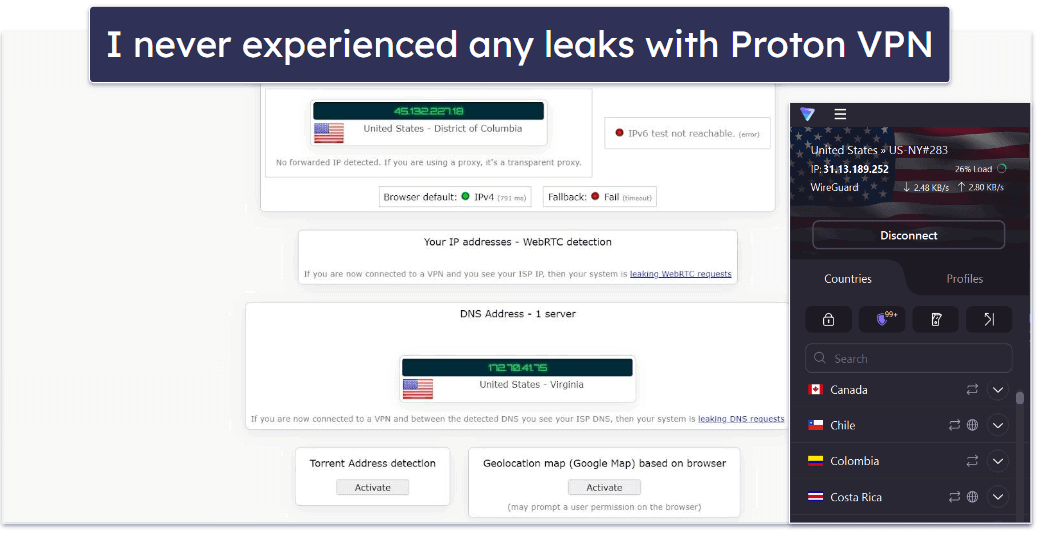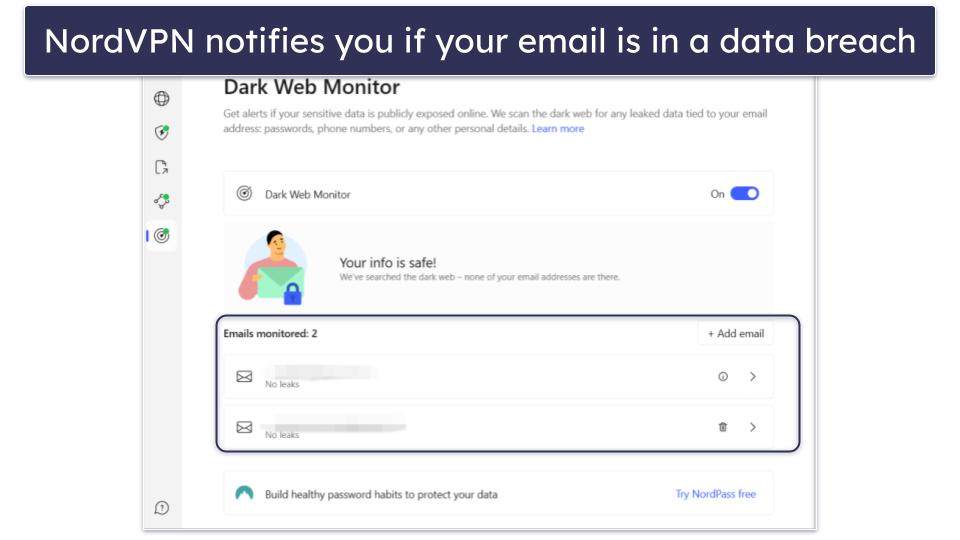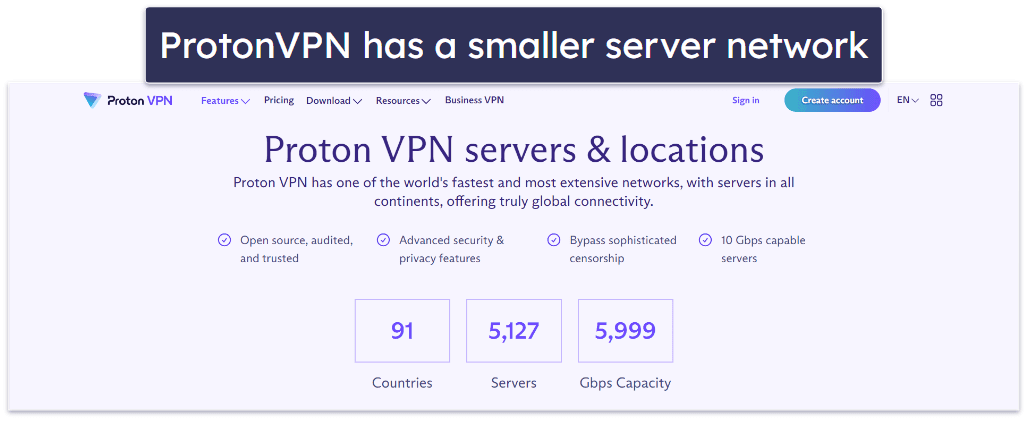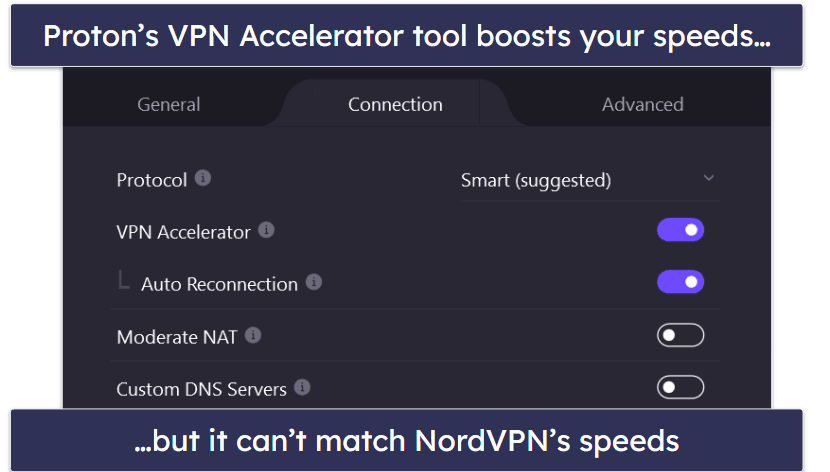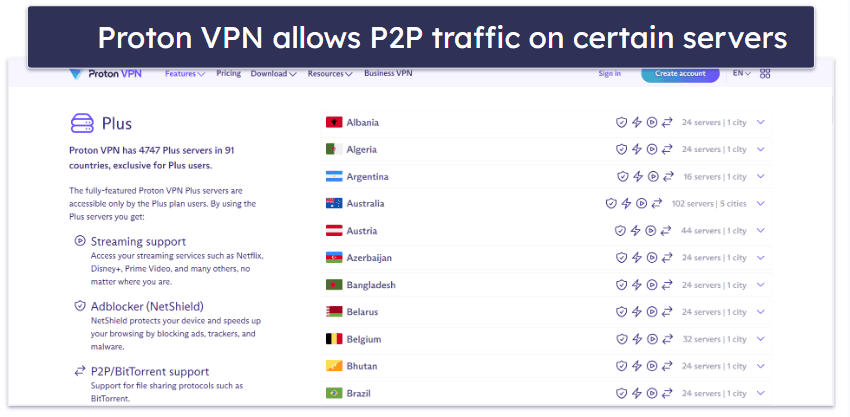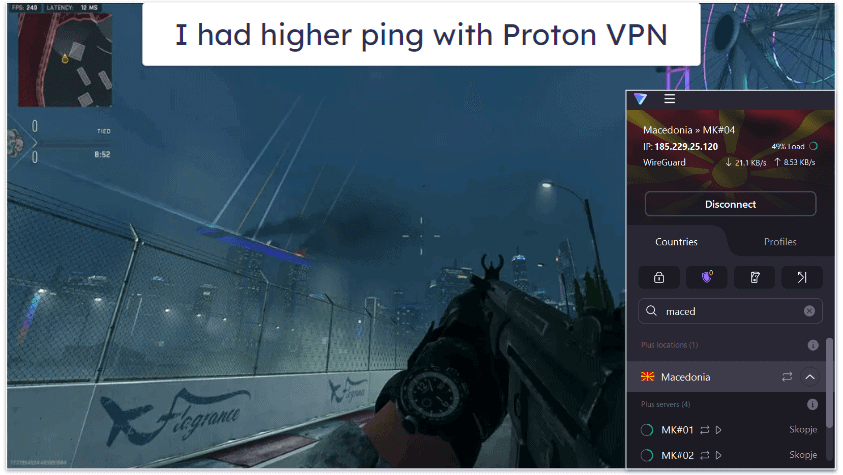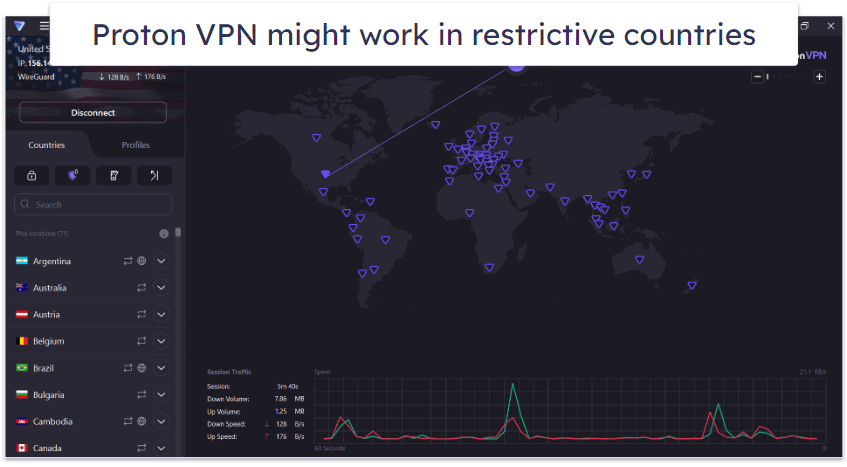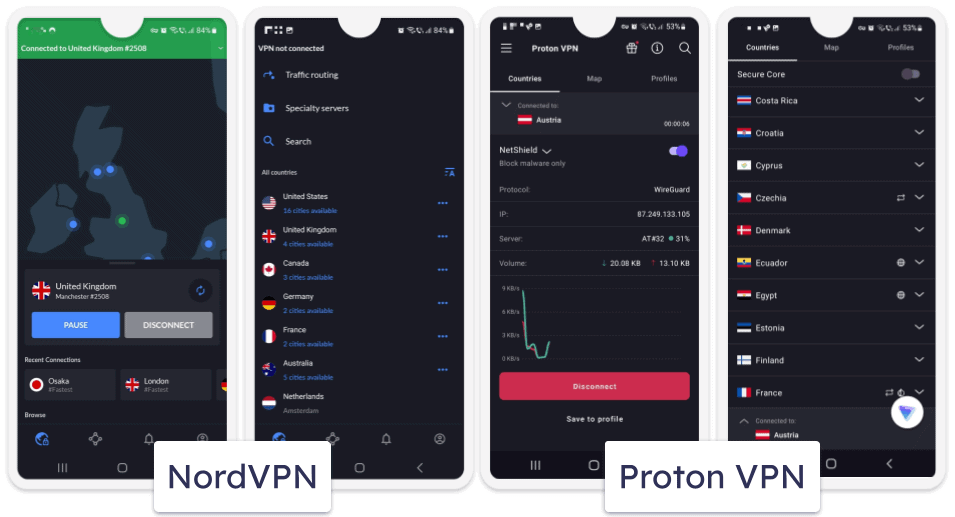
Tim Mocan
Updated on: January 21, 2025
Fact-checked by Katarina Glamoslija
Short on time? Here’s the final verdict:
-
🥇 NordVPN
— Winner in Extra Features, Servers, Speeds, Torrenting, and Customer Support. Has more additional features than Proton VPN, offers a much bigger server network, is much faster, comes with better P2P support, and provides better customer support.
NordVPN and Proton VPN are among the best VPNs in 2025 — they have very strong security and privacy features, provide really good streaming support, and come with beginner-friendly apps for all major platforms.
Both providers have essential security features, including 256-bit AES encryption, a kill switch, and a no-logs policy — in addition, they also have:
- Full leak protection.
- Perfect forward secrecy.
- Obfuscation.
- An ad, third-party tracker, and malicious site blocker.
- Double VPN connections.
- Tor (The Onion Router) support.
- Split-tunneling.
However, there are some pretty big differences between the two VPNs. NordVPN has 7,169 servers in 118 countries, maintains fast speeds on all servers, allows P2P traffic on servers in 110+ countries, can also protect you from malicious downloads, and has live chat support. On the other hand, Proton VPN’s server network is smaller (2,900+ servers in 112 countries), has noticeable slowdowns on distant servers, only provides 300+ P2P servers in 15+ countries, lacks malware protection, and doesn’t offer live chat support — but it has a really good free plan, and it works with 30+ streaming services (NordVPN only works with 10+ streaming sites).
I used different metrics to compare NordVPN and Proton VPN — security, extra features, privacy, server networks, speeds, streaming, P2P support, gaming, bypassing firewalls, ease of use, pricing, and customer support. I personally consider NordVPN to be the winner, but I recommend reading my whole comparison to see which VPN would provide you with the best value.
NordVPN vs. Proton VPN — Quick Overview
Security — Both VPNs Are Very Secure
You get strong security with either VPN, as they both come with industry-standard VPN security features, such as:
- 256-bit AES encryption. Makes all data unreadable, so that nobody can spy on it. Banks and the military also use the same level of encryption.
- No-logs policy. Prevents the VPN provider from logging your IP address, which reveals your location, and your traffic, which includes the sites you visit and the files you download.
- Kill switch. Disables all internet access if the VPN connection drops to protect you from data leaks.
In addition to a system-level kill switch, NordVPN also comes with an app-level kill switch. This allows you to choose apps that will be shut down if the VPN disconnects — I tested this with 5+ P2P apps, and it always worked without issues.
You also get full leak protection with both VPNs — I ran leak tests on servers in 5+ countries from each provider, and I never experienced any leaks.
What’s more, each provider comes with perfect forward secrecy, which is an advanced feature that changes the encryption key for each VPN connection. This prevents hackers from compromising and using past or future encryption keys to spy on your traffic.
However, only NordVPN has RAM-only servers, which means that every server reset wipes all data. But I think Proton VPN makes up for that by having full-disk encryption, which ensures all data on the provider’s servers stays safe even if the servers are compromised.
Both VPNs have secure protocols like OpenVPN and IKEv2/IPSec. Proton VPN also has WireGuard, which is very fast and secure, and its proprietary Stealth protocol, which provides obfuscation (hides your VPN traffic). On the other hand, NordVPN comes with a proprietary protocol called NordLynx, which is built around WireGuard.
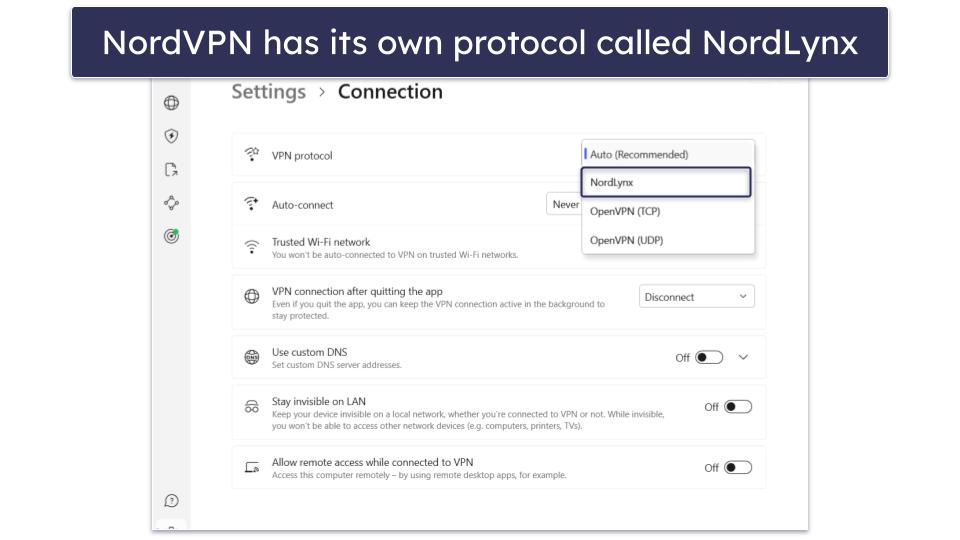
Finally, I really like how both providers let you secure your accounts with multi-factor authentication, which requires you to enter a time-sensitive code that’s generated by an app or a security key to authorize each login attempt.
Winner (Security): It’s a Tie
I just couldn’t pick a winner because both NordVPN and Proton VPN provide very strong security — they both have essential VPN security features, come with advanced security features like full leak protection and perfect forward secrecy, provide secure VPN protocols, and let you protect your VPN accounts with multi-factor authentication. Plus, NordVPN has RAM-only servers, while Proton VPN has full-disk encryption.
Extra Features — NordVPN Wins This Round
Both NordVPN and Proton VPN have useful additional features, but NordVPN is just better, as it comes with a few more extras than Proton VPN.
Both VPNs come with split-tunneling, which lets you pick which apps or sites use the VPN connection, and which apps or sites use your local network.
You also get obfuscation with each provider — this is a feature that hides your VPN traffic and makes it look like regular internet traffic. This provides better privacy and might also help you circumvent restrictive firewalls.
In addition to obfuscation, Proton VPN has Alternative Routing, which should help you access the provider’s VPN service if it’s blocked in your area.
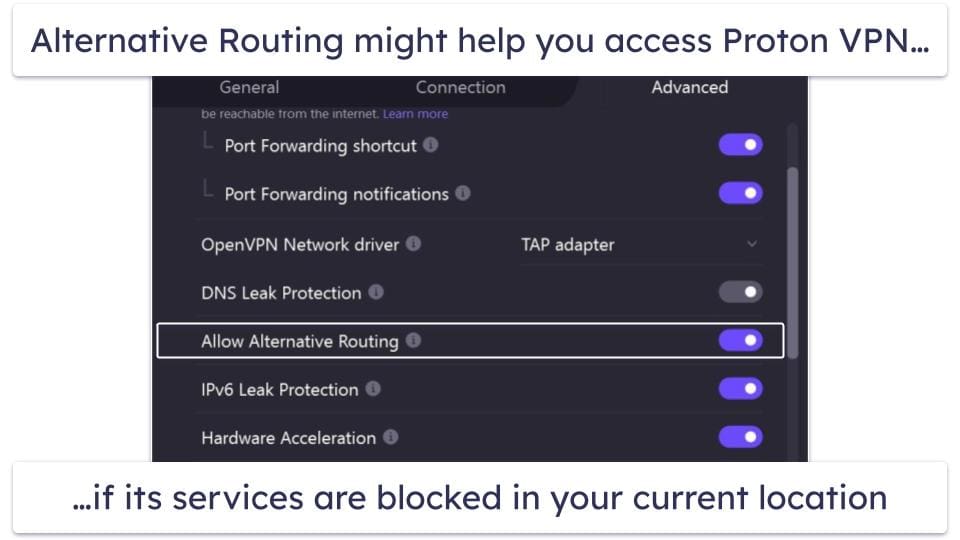
And both VPNs can block ads, third-party trackers, and malicious sites — NordVPN does it via Threat Protection, and Proton VPN does it via NetShield. But I think Threat Protection is better because it can also protect you from malicious downloads, plus it’s also more convenient because you don’t need to be connected to a VPN server for the feature to be active.
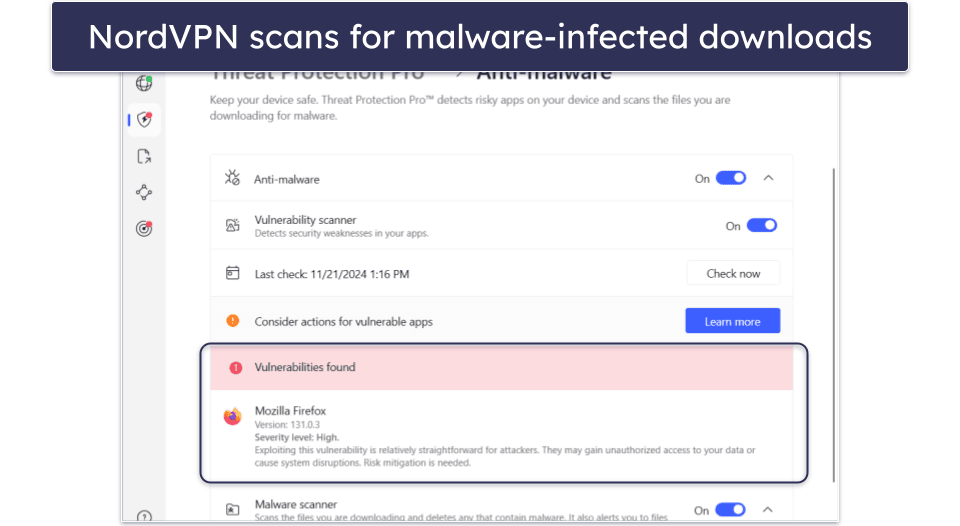
Plus, I like that both providers allow Tor traffic on all of their servers, so you can first secure your data with NordVPN or Proton VPN before accessing dark web sites. In addition, NordVPN has Onion Over VPN servers, and Proton VPN has Tor over VPN — both features are convenient, as they allow you to access dark web sites in regular browsers like Chrome and Firefox, so you don’t need to download and use theTor browser.
However, only NordVPN has a smart DNS, which lets you use a VPN on devices that don’t support native VPN apps, such as certain smart TVs and gaming consoles.
Also, Proton VPN’s Secure Core feature is similar to NordVPN’s double VPN servers, as both features send your data through 2 VPN servers instead of 1 server to provide better security — but Secure Core routes your traffic through 1 server that’s always located in a privacy-friendly country.
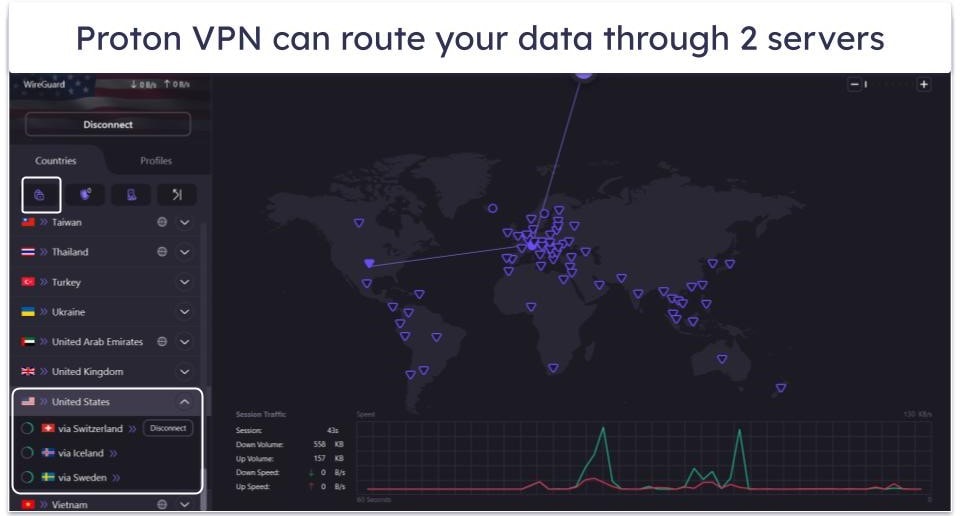
NordVPN also has these additional features, which Proton VPN lacks:
- Dark Web Monitor. Alerts you if it detects that your NordVPN login credentials have been compromised.
- Tapjacking protection. Stops malicious apps from using screen overlays to trick you into performing actions that might endanger your data. The feature will send you an alert when it detects that an app has added a screen overlay.
- Meshnet. Allows you to connect up to 60 devices over encrypted VPN connections. This is useful for hosting secure virtual LAN parties, or securely sharing data between devices while traveling.
- Dedicated IP addresses. These are IP addresses that are only assigned to you. They help you avoid reCAPTCHAs and connect to bank sites (most of them block shared VPN IP addresses). The provider’s dedicated IP addresses are available for a small extra cost, and you can get a dedicated IP from the US, Canada, the UK, Germany, France, the Netherlands, and Japan.
- SOCKS5 support. SOCKS5 proxy servers hide your IP address just like a VPN, but they don’t provide encryption. So you get significantly faster speeds.
And Proton VPN comes with extras, which NordVPN doesn’t have:
- VPN Accelerator. Uses speed-enhancing technologies to boost VPN speeds on distant servers.
- Profiles. Lets you customize your VPN connection preferences — like setting up a profile that automatically connects you to a torrenting server via a specific VPN protocol.
- Port forwarding. Lets you connect to more peers to get faster P2P speeds.
Winner (Extra Features): NordVPN
Both VPNs have great extra features, but I think NordVPN is just better. Both providers have split-tunneling, obfuscation, an ad blocker, Tor support and features that let you surf Tor sites in regular browsers, double VPN connections, and P2P-related features that boost speeds — but NordVPN’s ad blocker is more convenient, and it protects you from malicious downloads on top of ads, third-party trackers, and shady sites, and the provider also has a smart DNS. In addition, NordVPN comes with many other features, including Dark Web Monitor, tapjacking protection, Meshnet, and dedicated IP addresses.
Privacy — Both VPNs Provide Very Strong Privacy
I think both VPNs are really great for privacy — they both have strict no-logs policies that don’t collect any sensitive data, like your IP address and traffic.
What’s more, each provider’s no-logs policy has been independently audited. NordVPN’s no-logs policy passed several audits in 2018, 2020, and 2022, and it was also proven true in 2018 when one of the data centers that housed the provider’s servers suffered a breach, but no user data was leaked. And Proton VPN’s no-logs policy was independently audited in 2022.
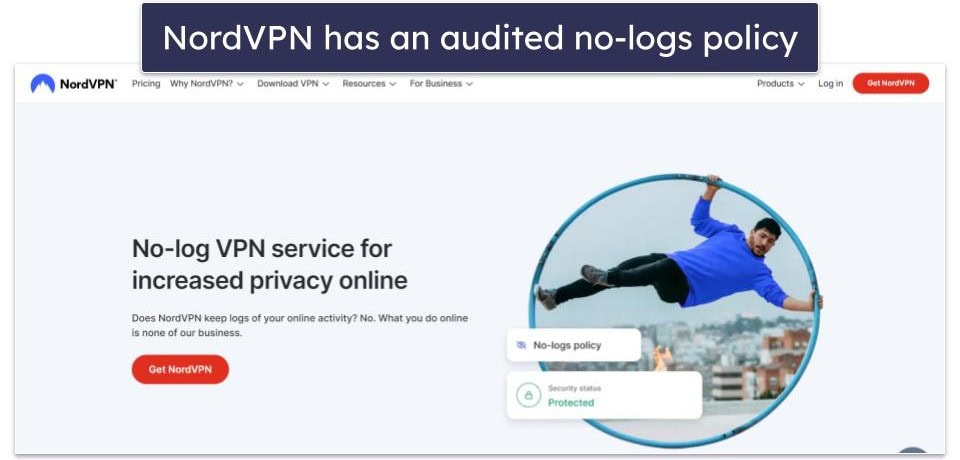
In addition, Proton VPN also releases regular transparency reports, which detail all the user data requests it receives from governments and also prove that the VPN doesn’t comply with them.
All of Proton VPN’s apps are open-source, which means anyone can inspect the code for security issues — and since most people don’t know how to do that, I really like that all of the provider’s apps have also been independently audited.
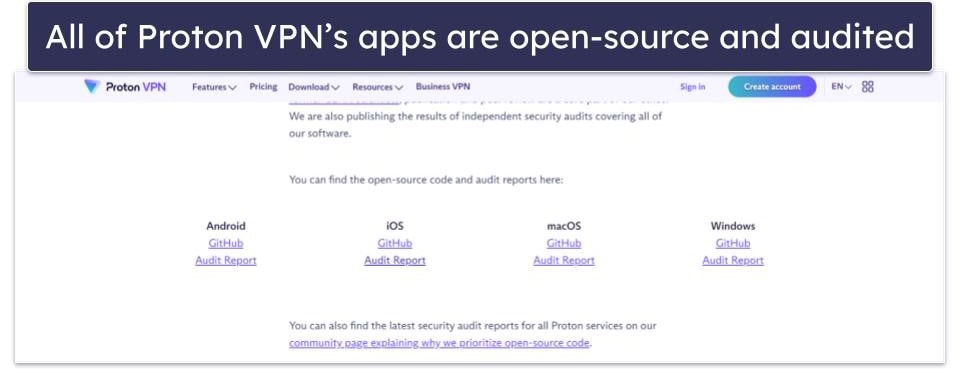
While NordVPN’s apps are not open-source, they have been audited — its iOS, Android, Windows, and macOS apps passed security audits in 2019.
What’s more, both VPNs are based in privacy-friendly locations — NordVPN is located in Panama, while Proton VPN is headquartered in Switzerland. Both countries are outside the jurisdictions of the 5/9/14 Eyes Alliances (a group of countries that share surveillance data), and lack mandatory data retention laws.
Finally, I like how both NordVPN and Proton VPN accept cryptocurrency payments, as they provide better privacy than standard payment methods.
Winner (Privacy): It’s a tie
It’s impossible to pick a winner in this case because both NordVPN and Proton VPN provide very good privacy features — they come with strict no-logs policies that have passed independent audits, are located in privacy-friendly countries, and accept cryptocurrency payments. Proton VPN also releases regular transparency reports and has open-source apps that have been audited, and NordVPN’s mobile and desktop apps have also passed security audits.
Servers — NordVPN Comes Out on Top
Proton VPN has a good server network, but NordVPN’s network is just better — it provides access to 7,169 servers in 118 countries, while Proton VPN only has 9,119 servers in 112 countries. While Proton VPN’s server count is enough for most people, you’re less likely to use overcrowded servers that slow down your speeds with NordVPN.
Both VPNs use physical servers, which are physically located in the country you connect to. Proton VPN also has virtual locations, which assign you an IP address from the country you connect to, but the server is physically located in a different country. However, this isn’t an issue — I ran leak tests on 5+ virtual locations from Proton VPN, and they always assigned me the correct IP address. Plus, I like how the provider is open about its use of virtual locations, as this provides transparency.
Both providers allow torrenting on their servers, but NordVPN’s P2P server network is much larger — it has P2P servers in 110+ countries, while Proton VPN only has P2P servers in 15+ countries.
What’s more, you get obfuscation with both VPNs. NordVPN supports it on 100+ servers in 15+ countries, while Proton VPN supports obfuscation across all of its servers via its Stealth protocol.
And both NordVPN and Proton VPN support streaming and Tor traffic on all servers. In addition, NordVPN has Onion Over VPN servers in Switzerland and the Netherlands, and Proton VPN has Tor over VPN servers in 5+ countries.
You get double VPN servers with both providers — NordVPN has double VPN servers in 5+ countries, and Proton VPN offers similar connections on its Secure Core servers, which are located in 112 countries.
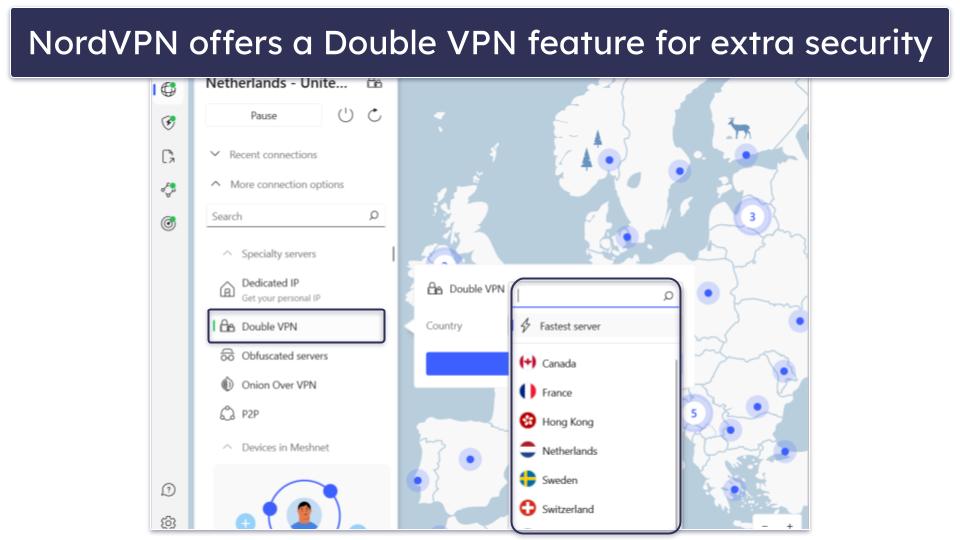
But only NordVPN has dedicated IP servers — it provides dedicated IP addresses in 5+ countries, including the US, the UK, and Japan.
Winner (Servers): NordVPN
Proton VPN’s server network is good, but it’s simply smaller than NordVPN’s network, which has 7,169 servers in 118 countries — Proton VPN only has 9,119 servers in 112 countries. NordVPN’s P2P server network is also bigger since it supports torrenting on servers in 110+ countries, while Proton VPN only has P2P servers in 15+ countries. And both providers have other types of servers, including double VPN servers, Tor-compatible servers and servers that let you browse dark web sites in normal browsers, and servers that support obfuscation — but only NordVPN comes with dedicated IP servers.
Speeds — NordVPN Is Much Faster
In my speed tests, NordVPN provided me with the fastest speeds. I also had good speeds with Proton VPN, but they were nowhere near as fast as NordVPN’s connections.
NordVPN provided me with fast speeds on nearby servers, and there were only some slowdowns on distant servers. On nearby servers, my connections were very smooth, as sites loaded instantly, and HD and 4K videos loaded instantly and there was no buffering. Also, it only took me around 11–13 minutes to torrent a 20 GB file, which is really good.
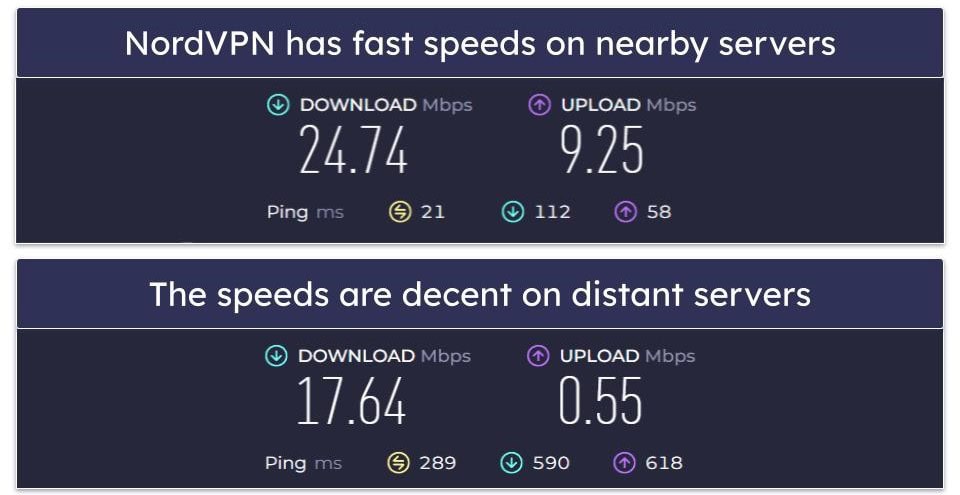
And on distant servers, there were some slowdowns, but they weren’t that bad — websites took up to 3 seconds to load, HD videos loaded in around 2 seconds and didn’t buffer, 4K videos loaded in 4–5 seconds and there was only minor buffering at the stat, and the same 20 GB file took approximately 18–22 minutes to download.
With Proton VPN, I had decent speeds on nearby servers, but I noticed pretty noticeable slowdowns on distant servers. On nearby servers, websites loaded instantly, it took HD videos 2–3 seconds to load (but they didn’t buffer), 4K videos loaded in 5 seconds and I experienced minor buffering, and I had to wait around 19–22 minutes for a 20 GB file to download.
On distant servers, sites loaded in 3–4 seconds, HD videos in 4 seconds and there was minor buffering at the start, and 4K videos loaded in 7–8 seconds and there was noticeable buffering while skipping through the videos — also, the same 20 GB file now downloaded in 30–32 minutes.
Proton VPN also comes with VPN Accelerator, which boosts connection speeds on distant servers — but even so, it still wasn’t able to provide me with faster speeds than NordVPN.
Winner (Speeds): NordVPN
While Proton VPN has decent speeds, it just can’t keep up with NordVPN — it provided me with really fast speeds on nearby servers, and I also had fast speeds and only experienced some slowdowns on distant servers. With Proton VPN, I had acceptable speeds on nearby servers, but experienced noticeable slowdowns while browsing, streaming, and torrenting on distant servers.
Streaming — Both VPNs Are Great for Streaming
I think either VPN is a great pick for streaming — NordVPN works with 10+ streaming platforms, while Proton VPN works with 30+ streaming services, but you get great variety with each provider.
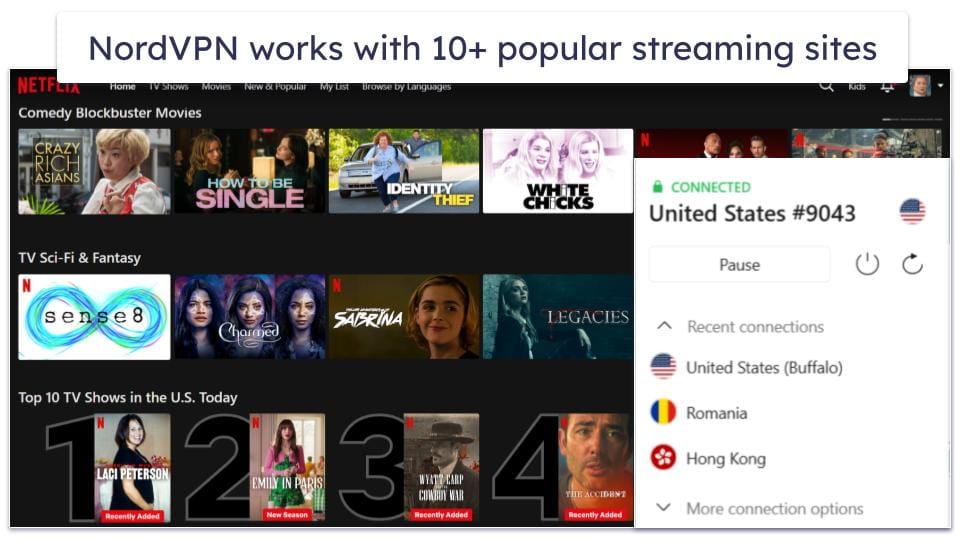
Both NordVPN and Proton VPN are great Netflix VPNs, as they consistently work with the platform. They can both access 10+ Netflix libraries, including popular ones like Netflix US and Netflix UK.
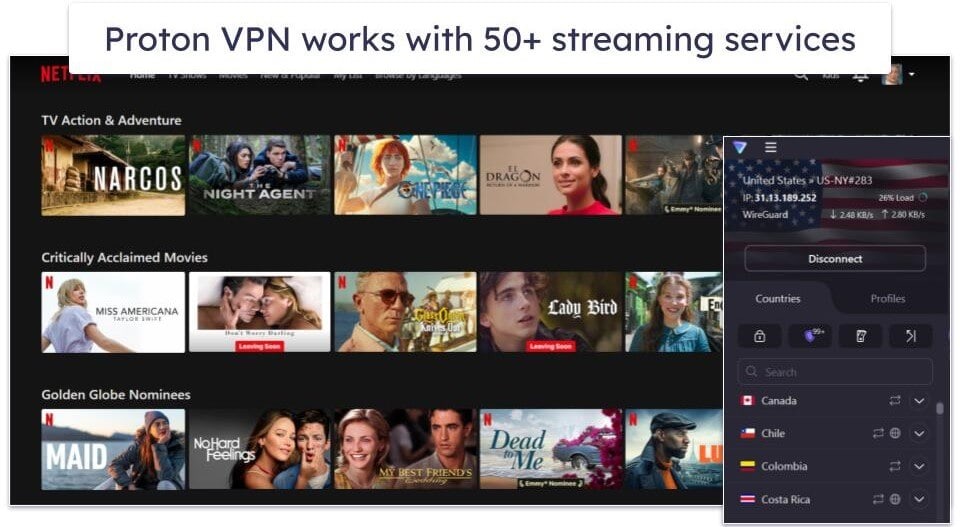
And on top of Netflix, both providers also work with other popular streaming platforms, such as Max, BBC iPlayer, Disney+, and Amazon Prime.
However, only NordVPN comes with a smart DNS, which lets you use a VPN on devices that don’t support VPN apps, like gaming consoles. In addition, the provider also has SmartPlay on all of its VPN servers, which combines VPN and smart DNS technology to improve how encrypted your connection is.
Winner (Streaming): It’s a tie
I can’t really pick a winner because you get great streaming with both NordVPN and Proton VPN. They both work with Netflix and other popular streaming services like Amazon Prime, BBC iPlayer, and Disney+. NordVPN only works with 10+ streaming platforms, while Proton VPN works with 30+ streaming sites — but NordVPN is also the only one that comes with a smart DNS.
Torrenting — NordVPN Is Much Better for Torrenting
While both VPNs are good for torrenting, NordVPN’s P2P server network is better. It comes with P2P servers in 110+ countries, while Proton VPN only has 300+ P2P servers in 15+ countries. So, with ProtonVPN, you’re more likely to use overcrowded servers, and it’s also harder to torrent on nearby servers — both these things will slow down your P2P speeds, which is exactly why I had slower downloads with Proton VPN than with NordVPN.
On the plus side, both providers work with popular torrenting clients. I tested them with apps like uTorrent, Vuze, and Deluge, and never encountered any issues.
And they also have P2P-related features that improve download speeds — NordVPN has SOCKS5 proxy servers that change your IP address and don’t provide encryption (so you get much faster downloads), and Proton VPN has port forwarding, which allows you to connect to more peers to get faster speeds.
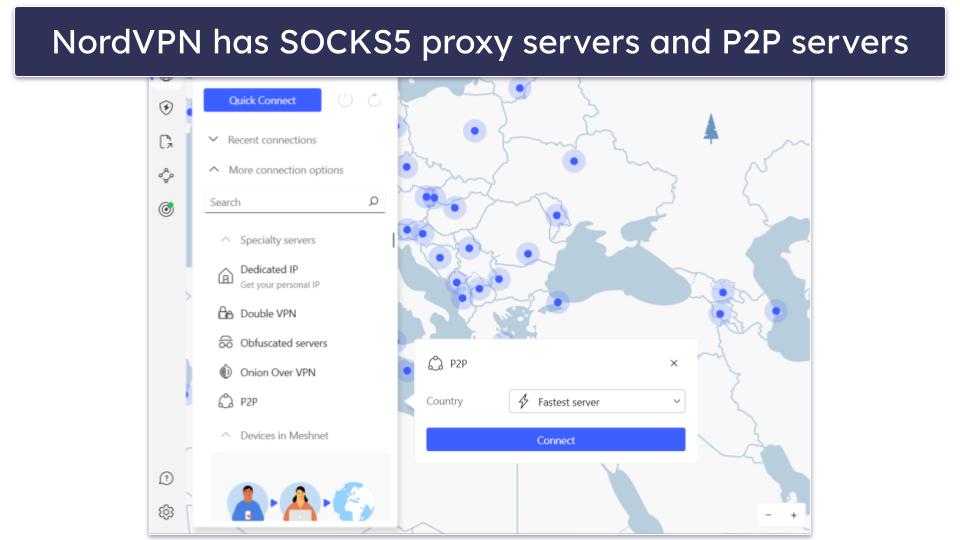
What’s more, you get very strong security and privacy while torrenting with both NordVPN and Proton VPN. They both have a kill switch, full leak protection, and a no-logs policy that have been independently audited.
Both VPNs also have ad blockers, but I like NordVPN’s ad blocker more — in addition to getting rid of ads on P2P sites and blocking connections to shady torrenting sites, it can also protect you from malicious P2P downloads.
Finally, I ran leak tests before torrenting with each VPN to make sure it’s safe to use — I never saw any leaks. On top of that, I ran torrent IP leak tests to make sure P2P apps won’t reveal my real IP address, and the results always showed each provider’s IP addresses.
Winner (Torrenting): NordVPN
This was a tough choice because both providers are good for torrenting, but NordVPN is ultimately better. It has P2P servers in 110+ countries, which is significantly more than Proton VPN’s P2P servers in 15+ countries. And while both VPNs can block ads on P2P sites and prevent connections to malicious P2P sites, only NordVPN can protect you from malware-infected torrent downloads. Other than that, both VPNs work with top P2P apps, provide P2P-related features (NordVPN has SOCKS5 support, and Proton VPN has port forwarding), and have good security and privacy features for torrenting.
Gaming — Either VPNs Is a Good Pick
You get an enjoyable experience with both NordVPN and Proton VPN. I played a few rounds of Counter-Strike: Global Offensive with both VPNs and had good ping on nearby servers with each provider. On distant servers, I had higher ping with Proton VPN, but I also experienced minor lag with both VPNs — luckily, it wasn’t game-breaking.
You get protection against Distributed-Denial-of-Service (DDoS) attacks with both VPNs, but only Proton VPN has anti-DDoS protection on its servers — this way, if someone were to DDoS you while you’re connected to the VPN, they wouldn’t be able to do it. If they were to do that with NordVPN, they would be able to disconnect you from the VPN server.
I like how both VPNs support manual setups on routers. This allows you to use them to secure your connections to online games on devices that don’t support VPN apps, like Xbox or PlayStation gaming consoles.
Unfortunately, neither provider comes with cloud gaming support. So there’s no guarantee you can use these VPN services to access platforms that stream games to portable devices like smartphones and laptops.
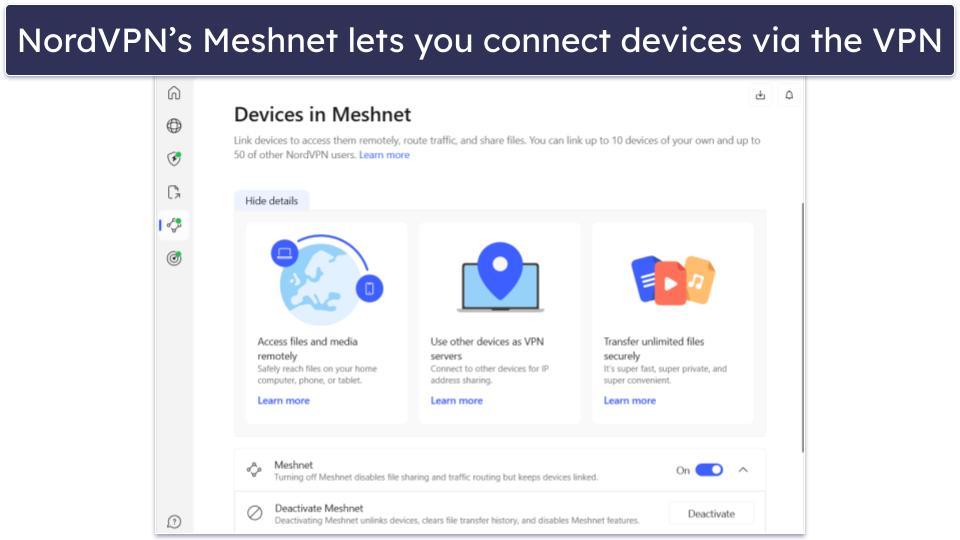
NordVPN also comes with Meshnet, which lets you link up to 60 devices over encrypted VPN connections — this is useful if you want to host a virtual LAN party with your friends, as it allows you to secure your connections to your friends’ devices.
Winner (Gaming): It’s a tie
Both NordVPN and Proton VPN are good for gaming — they provide decent ping and connection speeds (although I did experience some minor lag), prevent DDoS attacks, and allow manual setups on routers. Only Proton VPN comes with anti-DDoS protection on all of its servers, but NordVPN has MeshNet, which is useful for virtual LAN parties.
Bypassing Censorship — Neither VPN Is a Good Pick
Even though both providers have obfuscation, they’re not good options if you’re in a restrictive country — ProtonVPN’s support reps confirmed that the VPN only maybe works in restrictive countries like Russia, Iran, Indonesia, and Saudi Arabia. NordVPN doesn’t work in any of these countries.
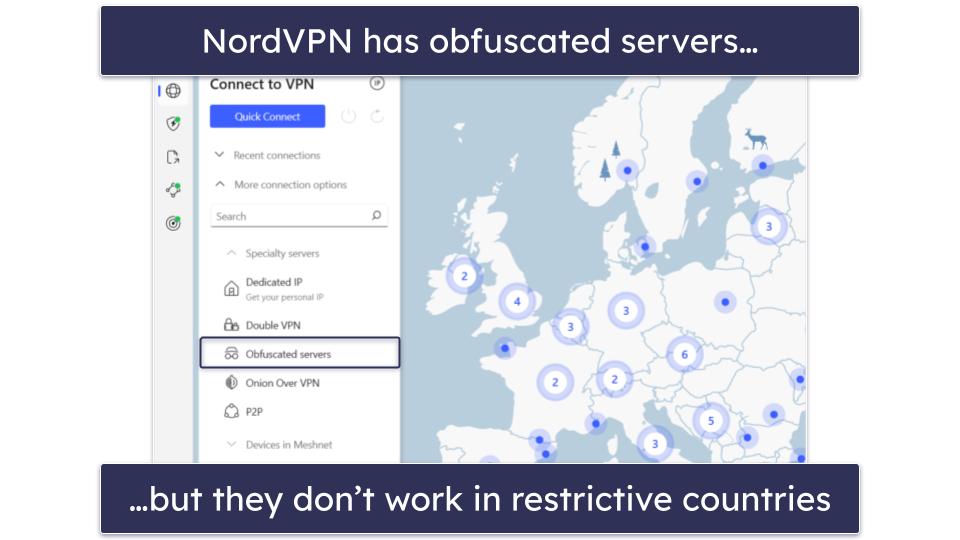
If you’re looking for a VPN that can circumvent government censorship, I recommend ExpressVPN — it consistently works in all restrictive countries without issues, and it’s also our #1 pick for the best VPNs for getting around government firewalls in 2025.
Winner (Bypassing Censorship): None
NordVPN and Proton VPN can’t guarantee that their services will work in most restrictive countries. So, I recommend picking ExpressVPN instead because it always works in restrictive regions without any problems.
Apps & Ease of Use — Both Providers Have User-Friendly Apps
Both NordVPN and Proton VPN come with apps for all major platforms — iOS, Android, Windows, macOS, Linux, smart TVs (Android TV and Fire TV), and Chromebook. In addition, they allow manual setups on many router models.
I’m happy with both VPNs’ mobile apps, as they have quick-connect features that automatically connect you to the fastest server and also come with digital maps that make it simple to quickly pick a server to connect to. In addition, their mobile apps are intuitive and provide helpful explanations for all settings and features.
And both providers have great, feature-rich desktop apps that are very simple to navigate and use. That said, I think it’s somewhat easier to install Proton VPN’s macoS app — that’s because it only has 1 macOS app version, while NordVPN has 2 macOS app versions (the OpenVPN app, and the IKEv2/IPSec app), which is a little confusing.
Also, both NordVPN and Proton VPN allow you to manually set up their services on a router. And I like how each provider has helpful tutorials that make the whole process pretty simple.
Winner (Apps & Ease of Use): It’s a tie
Both NordVPN and Proton VPN provide great ease of use — they have apps for the most popular operating systems, allow manual router setups, and provide access to very intuitive mobile and desktop apps that are also simple to install.
Plans & Pricing — Both VPNs Are Good Options
Both VPNs provide great value and are also affordable, although NordVPN has slightly cheaper plans than Proton VPN. On the other hand, NordVPN only allows 10 simultaneous connections, while Proton VPN supports 10 connections, which is on the upper end of the industry average of 5–10 connections.
NordVPN comes with a 1-month, a 1-year, and a 2-year plan for a few tier-based subscriptions, which are called Standard, Plus, and Complete. The Standard subscription has all VPN features and starts at £2.76 / month, the Plus subscription adds a password manager called NordLocker, and the Complete subscription adds a cloud encryption service called NordLocker.
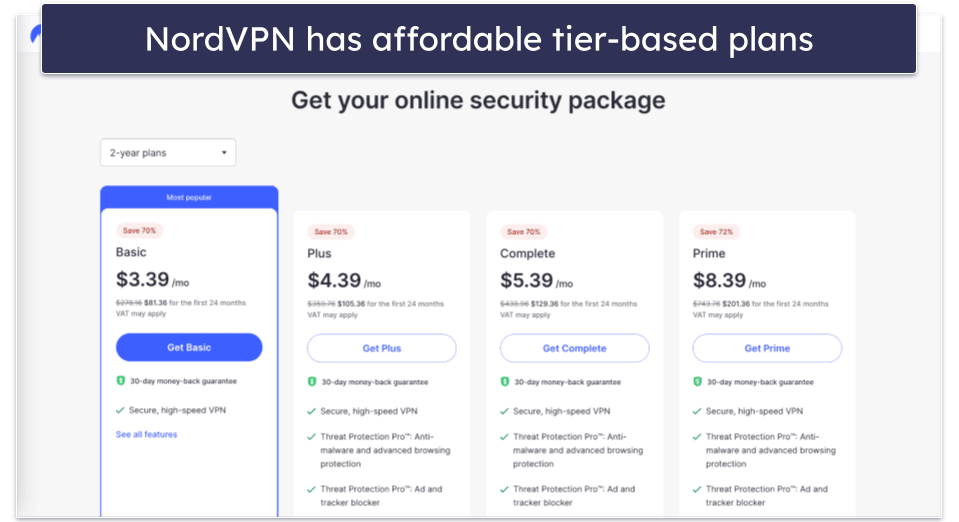
Proton VPN has a 1-month, a 1-year, and a 2-year plan. Its longest plan provides the best savings, as it starts at £2.92 / month.
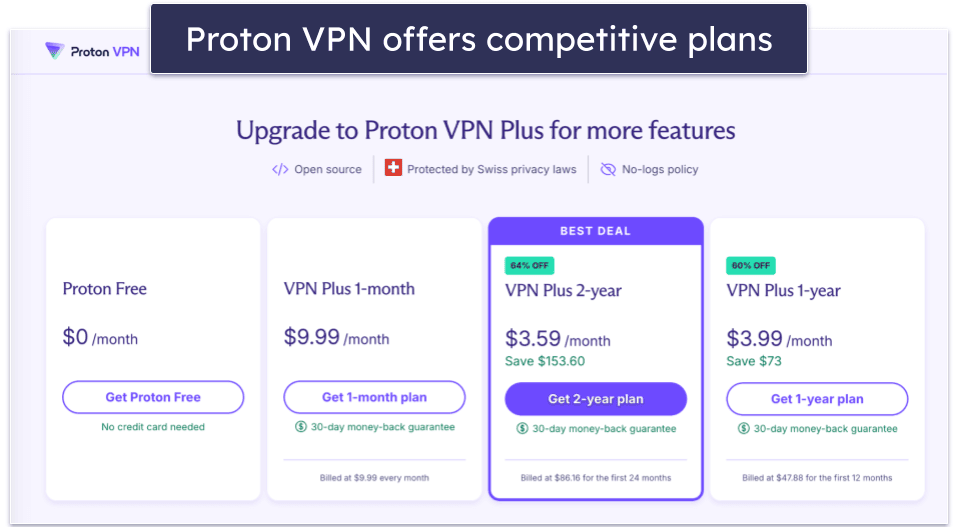
Unlike NordVPN, Proton VPN also comes with one of the best free plans on the market — it allows unlimited data, provides strong security and privacy features, and has good speeds. That said, the free plan limits you to servers in 3 countries (the US, the Netherlands, and Japan), only lets you connect 1 device, and doesn’t have streaming or P2P support.
Both NordVPN and Proton VPN accept credit/debit cards, PayPal, and cryptocurrencies. Proton VPN is also one of the few VPNs on the market that accepts cash payments.
Finally, both VPNs have a 30-day money-back guarantee, but I like NordVPN’s refund policy more — Proton VPN’s refund is prorated, which means you’re billed for every day that you use the VPN until the 30-day deadline (in contrast, NordVPN provides a full refund).
Winner (Plans & Pricing): It’s a tie
I can’t pick a winner because you get good value with both NordVPN and Proton VPN. They’re affordable, their plans provide access to all VPN features, they accept multiple payment methods (including cryptocurrencies), and they have 30-day money-back guarantees — although, Proton VPN’s refund is prorated. On the plus side, Proton VPN also has a really good free plan.
Customer Support — NordVPN Has the Upper Hand
Both NordVPN and Proton VPN’s support libraries impressed me, as they’re packed with useful frequently asked questions (FAQs), instructional guides, and troubleshooting manuals. Both VPNs also incorporate useful screenshots into their manuals, and NordVPN even offers some video guides.
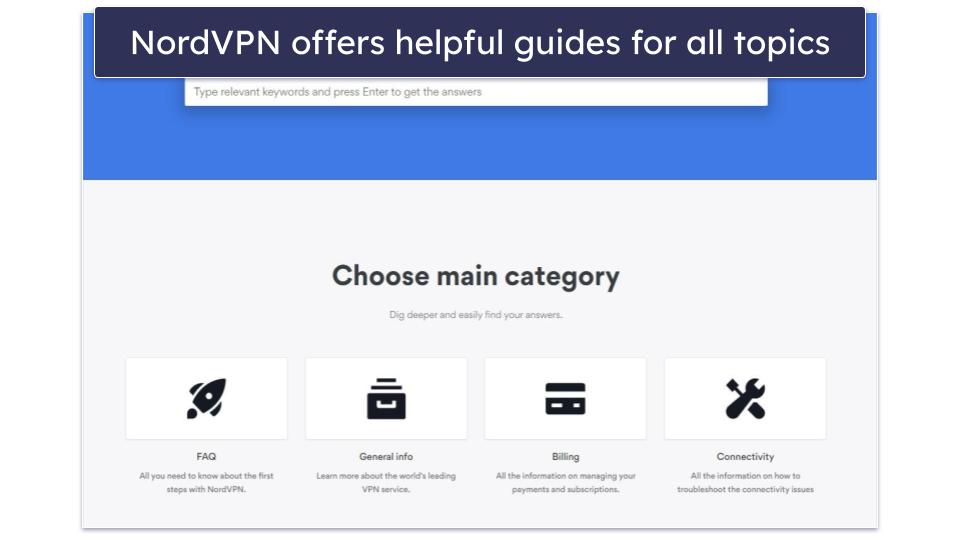
But only NordVPN comes with live chat, which is the fastest way to contact a provider’s customer support reps. Even better, the provider has 24/7 live chat, which is really convenient. On average, it took only around 4–5 seconds to be connected to a live chat rep, and they were always able to provide me with friendly, helpful answers.
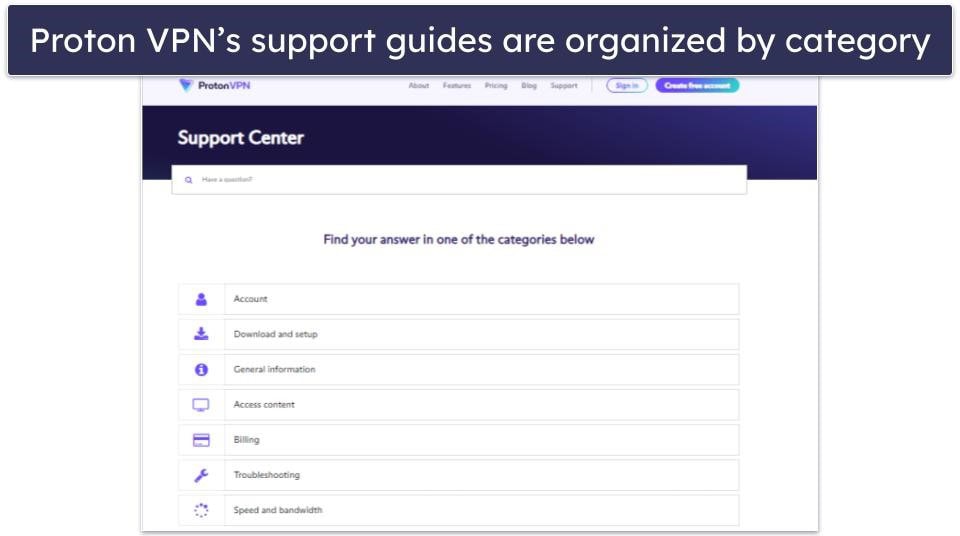
Both NordVPN and Proton VPN have email support, but NordVPN’s email support is more responsive — I usually received a reply in less than 24 hours, while Proton VPN’s email support reps generally took more than a day to reply. On the plus side, both providers’ email reps were able to answer all of my questions.
Winner (Customer Support): NordVPN
It’s a little hard for Proton VPN to compete with NordVPN’s customer support — while both VPNs have great support libraries, only NordVPN comes with live chat support. And while both providers have email support, NordVPN replies faster than Proton VPN.
Overall Winner: NordVPN
NordVPN has very strong security and privacy features, 7,169 servers in 118 countries, and great torrenting support (P2P servers in 110+ countries). It also has fast speeds on all servers, offers good streaming and gaming support, is affordable, has user-friendly apps, and provides really great customer support.
Proton VPN is also highly secure, works well with popular streaming services, is good for gaming, offers user-friendly apps, and provides good customer support. It has 9,119 servers in 112 countries (but it only allows torrenting on 300+ servers in 15+ countries), has affordable paid plans and one of the best free plans out there.
Both VPNs are good picks in 2025, but I think NordVPN is better — it has more additional features, provides a much larger server network, is much faster, allows P2P traffic on more servers, and comes with better customer supports because it has live chat.
Frequently Asked Questions
Is NordVPN better than Proton VPN?
According to my tests, yes — NordVPN outperforms Proton VPN in extra features, server network, speeds, torrenting, and customer support. But I wasn’t able to pick a winner when it came to security, privacy, streaming, gaming, ease of use, and pricing.
Is NordVPN faster than Proton VPN?
Yes, NordVPN provided me with much faster speeds than Proton VPN — I had very fast speeds on nearby servers, and I only experienced minor slowdowns on distant servers. With Proton VPN, however, I had decent speeds on nearby servers but experienced pretty noticeable slowdowns on distant servers.
Which is better for torrenting — NordVPN or Proton VPN?
I think NordVPN has much better P2P support than Proton VPN. That’s because it has P2P servers in 110+ countries, while Proton VPN only has 300+ P2P servers in 15+ countries. So, with Proton VPN, you’re more likely to torrent on overcrowded servers, and it’s also harder to torrent on nearby servers — due to this, you’re more likely to have slower P2P speeds.
In addition, NordVPN has a better ad blocker than Proton VPN — it blocks ads on P2P sites and connections to shady P2P sites just like Proton VPN’s ad blocker, but it can also protect you from malware-infected torrent files.
Which is better for Netflix — NordVPN or Proton VPN?
Both providers are great for Netflix, as they consistently work with the streaming site. In addition to Netflix, NordVPN is also compatible with 10+ other streaming sites, while Proton VPN works with 30+ streaming platforms — that said, only NordVPN has a smart DNS, which lets you use a VPN on devices that don’t support VPN apps.




